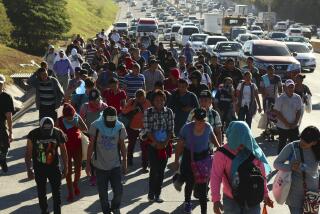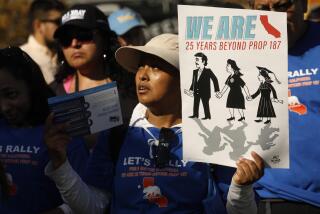U.S. Aid Will Foster Progress
During his journey through Central America next week, President Clinton’s agenda will illuminate the stark contrasts between past U.S. policies that fostered political polarization in the region and current approaches that pursue reconciliation and reconstruction.
For much of this century, the United States aided and abetted strongman rule that grossly and systematically violated human rights throughout the violence-torn isthmus save in democratic Costa Rica. In Nicaragua, under the realist doctrine attributed to Harry S. Truman--” . . . he’s a bastard but he’s our bastard”--the U.S. allied with the corrupt Somoza dictators who governed for two generations.
Particularly notorious was U.S. involvement in the violent overthrow of the democratically elected government in Guatemala in 1954. At the height of the Cold War, the U.S. feared that Jacobo Arbenz was a proto-communist intent upon expropriating United Fruit Co. properties and opening a bridgehead to Soviet agents. The ensuing civil wars raged for 30 years and costs ten of thousands of Guatemalan lives.
In contrast, in the 1990s the U.S. has worked with the United Nations, the Organization of American States and Latin American governments to help the Central Americans overcome ideological divides, put down their arms and resolve their differences through the democratic process. The very same civil wars that the U.S. stoked with arms and ideology in the 1980s, the U.S. helped to bring to a close in El Salvador, Nicaragua and most recently in Guatemala.
In the mid-1990s, the U.S. phased down its economic and military assistance programs. Critics denounced this alleged “withdrawal,” but it had the salutary effect of weaning Central Americans away from a debilitating dependence upon Washington. The U.S. encouraged Central Americans to look to each other--not to U.S. proconsuls--to settle local disputes.
In the 1990s, the Central American economies began to grow again, even as U.S. bilateral assistance declined. Multinational aid agencies--less political than traditional U.S. bilateral aid--counseled market-oriented economic reforms that spurred growth. In addition, U.S. consumers created jobs in Central America by purchasing its fresh fruits and vegetables, clothing and other light manufactures.
Now, in the wake of the terrible devastation caused by Hurricane Mitch, U.S. aid will hit another peak. Clinton has proposed a multiyear, $1-billion assistance package. Some $600 million in reconstruction aid would restore sanitation systems, help rebuild houses, schools and roads and provide farmers with seeds and fertilizer. The World Bank and Inter-American Development Bank would do their share as well.
To ensure that the future does not resemble the past, U.S. officials recognize that this time foreign assistance should foster democratic governance, environmental protection and regional cooperation. Without returning to a patronizing micromanagement, the U.S. can provide Central Americans with tools and rules to succeed on their own.
International donors hope to help construct more honest and capable governments. To stem corruption, donors plan to assist Central American governments to establish effective auditing and financial control systems. Aid programs should also build partnerships between democratic governments and grass-roots organizations, often the best guarantors of official accountability.
To better protect human rights, aid can spur the reform of judicial systems. The U.S. has international programs to train public defenders, reform criminal procedures codes, create anti-corruption strike forces, and open schools for educating judges.
The deadly mudslides unleashed by Mitch were the legacy of decades of deforestation. Now, aid programs plan to assist farmers to use methods less likely to cause soil erosion. Local governments can be encouraged to adopt land-use planning systems that protect key ecosystems.
Most important for the long term, all the countries of the Western Hemisphere (save Cuba) are pledged to negotiate by 2005 a Free Trade Area of the Americas. A hemisphere-wide trade accord would entwine Central America into the largest collection of free-market democracies in the world. Clinton can use this trip to educate a reluctant U.S. Congress on the many ways that regional free trade can advance Central American democracy and create jobs that lessen migration.
During his visit, Clinton need not directly apologize for past U.S. errors. Overt mea culpas are usually expected of defeated powers, not of reigning superpowers. Moreover, such judgments are better left to historians and to the citizens of the affected countries.
Rather, the U.S. should empower those making such judgments with the full facts, and continue to declassify relevant documents from its own archives. Recently, the Guatemalan truth commission drew on declassified U.S. materials in composing its unflinching story detailing decades of civil violence.
While advancing his forward-looking approaches, Clinton can make it clear that the United States has learned the right lessons from past follies. As he has done in other settings, Clinton can note that during the Cold War, perceived geopolitical interests in Central America blinded U.S. policymakers to the legitimate concerns of small countries and the sufferings of their peoples--not an apology but an affirmation that the U.S. is now free to pursue more constructive policies in the region.
Finally, as he did in Chile last year, the president can position the United States side by side with democratic Central Americans and cry, “Never again”--never again should Central Americans be deprived of their political rights and freedoms.
More to Read
Sign up for Essential California
The most important California stories and recommendations in your inbox every morning.
You may occasionally receive promotional content from the Los Angeles Times.










